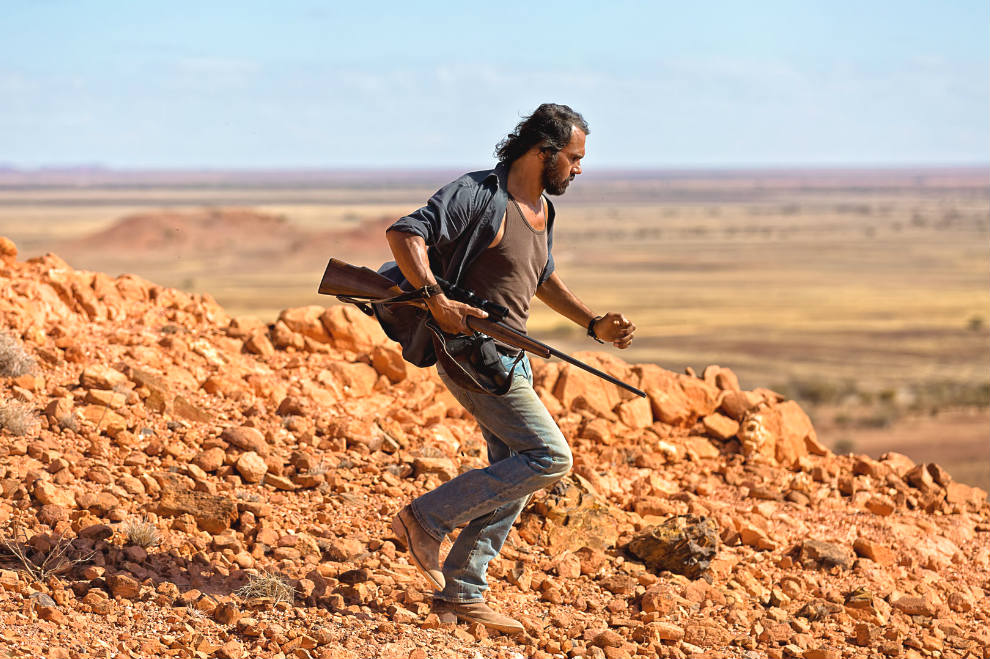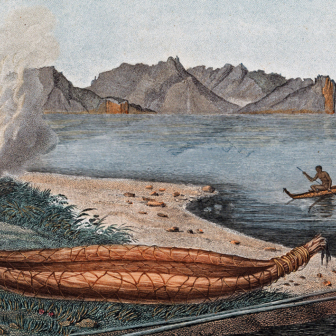The title invites a memory of wealth found and lost, somewhere in the outback, and makes ironic reference to people who keep on digging, against hope and against realism.
The sternness and sadness are there at the start in Aaron Pedersen’s face; this drunken outback cop is a self-condemned victim. What he cared for is lost, and he’s given up, not only on himself.
You could read into this a reversal of the optimism signalled at the end of Ivan Sen’s earlier Mystery Road, in which Pedersen played a different, hopeful moment in the life of the bush policeman, Jay Swan. Now, the opening of Goldstone lets us know that the hope has been lost, or else that it couldn’t have been realised.
The actor’s hair is nonchalantly shaggy, and he slouches round most of the time in a weather-beaten singlet. That image is not only of him, of the character with his manifest baggage of loss; it’s about all that Goldstone means as a place and a history. This is a particular way of looking not only at the outback and the bush but also – as you might see it – at Australia. As in Mystery Road (it could be from the same footage), the wider setting is of a flat, spreading, treeless and grassless landscape.
There are no houses in Goldstone; the one we see, positioned well away from Goldstone, is owned by the madam, the professional exploiter (expertly played by Jacki Weaver). The rest is a group of squalid vans, anchored in the sand; the main place of business is carried out in one marked by a blinking neon, “Pinky’s.” There is no sense of community, or even of a physical setting; we’re in the desert.
The girls, who line up dumbly presenting themselves, are Asian; the young policeman, whose arrival provokes their appearance, is utterly unprepared for what he finds. His moments of dialogue with one articulate victim open a perspective on what Goldstone, as a failed mining town and a failed frontier community, has become. The way it performs a story of exploitation is fully there in the bush pilot’s role, as played by David Wenham, brilliantly casual and crass; one of those outback figures who doesn’t know where he is.
The one who does know is played, with grace and irony, by David Gulpilil. The fate of his character can be linked to the whole setting; he isn’t part of its barrenness, but a figure from a certain past, calling the present to account. In his world there’s no place for Goldstone; and in ethical terms, Jay makes a choice to join him there.
The choice matters, since as an Aboriginal policeman his position is ambiguous. That’s the heart of this compelling story.
The Measure of a Man is the rather ponderous English title of the excellent La Loi du Marché, directed by Stéphane Brizé, and awarded numerous prizes at Cannes and elsewhere. Vincent Lindon plays Thierry, a man in his fifties, struggling first against unemployment, then against the demands of a job that requires him to work against his ethics, to be other than he is – that is, an intelligent man whose capacities are manifestly underused. He’s one who has never found his place. It is a subtle performance, the kind possible in cinema; the events of Thierry’s life are glanced at rather than shown.
So we understand, piece by piece, the family dilemma: the disabled adolescent son, intelligent and self-aware, whose needs will be making claims on his parents indefinitely. The film’s movements are rapid and glancing, with a lot of blurring and shallow focus; it’s a refusal of filmic rhetoric. Nothing is spelt out.
Thus the boy’s gesticulations and struggling speech, Thierry’s impassive acceptance of the hand the fates have dealt him, are all given without explication or commentary. The audience is invited to take this particular family’s life, as Thierry does, simply as part of the way things are; and Lindon’s performance is a model of actorly containment, its meanings unfolding on the way. •





